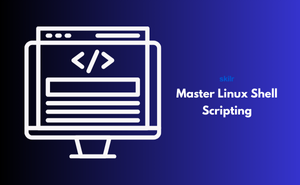👇 CELEBRATE CLOUD SECURITY DAY 👇
00
HOURS
00
MINUTES
00
SECONDS

Linux Shell Scripting is a powerful way to tell the Linux operating system what to do by writing a sequence of commands in a file. Instead of doing each task manually, scripts help automate processes like backups, monitoring, or software installations. This ensures efficiency, accuracy, and consistency in managing Linux systems.
By learning this skill, learners gain the ability to design scripts that simplify complex workflows. They can build automation for system administration, data handling, and server management. With shell scripting, professionals reduce errors, save time, and increase their overall effectiveness in managing Linux systems.
This exam is ideal for:
Domain 1 - Introduction to Shell Scripting
Domain 2 - Getting Started with Scripts
Domain 3 - Variables and Data Types
Domain 4 - Control Structures
Domain 5 - Working with Files and Directories
Domain 6 - User Input and Arguments
Domain 7 - Functions in Shell Scripts
Domain 8 - Process and Job Control
Domain 9 - Error Handling and Debugging
Domain 10 - Advanced Scripting Techniques
Industry-endorsed certificates to strengthen your career profile.
Start learning immediately with digital materials, no delays.
Practice until you’re fully confident, at no additional charge.
Study anytime, anywhere, on laptop, tablet, or smartphone.
Courses and practice exams developed by qualified professionals.
Support available round the clock whenever you need help.
Easy-to-follow content with practice exams and assessments.
Join a global community of professionals advancing their skills.
Yes, it makes you more efficient and opens opportunities in IT and DevOps.
It saves time, reduces errors, and automates repetitive tasks.
No, basic Linux command knowledge is enough to start.
It’s writing a list of commands in a file to automate tasks in Linux.
Yes, using cron jobs you can schedule scripts.
No, they complement programming by handling automation in Linux.
File handling, backups, monitoring, software installations, and more.
Absolutely, it helps automate security scans and monitoring.
Yes, it automates cloud server management and deployments.
Yes, scripts generally work across distributions with minor tweaks.
Bash (Bourne Again Shell) is the most widely used.
No, it’s useful for DevOps, cloud engineers, and data professionals too.
IT services, cloud providers, finance, healthcare, and cybersecurity.
Yes, debugging and error handling are covered.
Yes, it’s essential in DevOps, cloud, and IT environments.